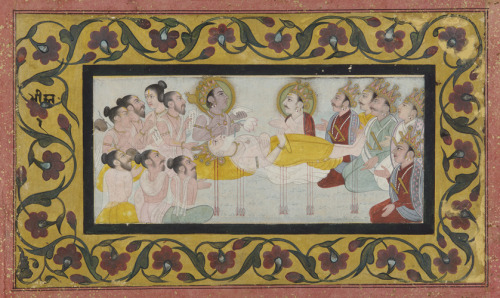महाभरत
Die to Live
| The Ten of Swords: Absolute Destruction. Die to Live. |
We continue with our adaptation of Mahabharata. The scene changes. Before retiring from the field, Krishna and the Pandavas come upon the great hero Bhishma, impaled on thousands of arrows.

BHIṢMA IMPALED
And Kṛṣṇa, hearing these sweet
words from the lady Kuntī, smiled. He led his chariot from the field of war to
the place where the great grand-sire of the Kurus and Paṇḍavas, Bhiṣma lay impaled
on the bed of arrows.
The
mighty Arjuna holds his Gandiva bow, his face grim and downcast. The sober
Yudhiṣthira, his older brother, the King, says a solemn prayer in a dark
whisper over the fallen soldier. Bhīma leans against his mace as it touches the
ground. Nakula bows his mighty sword.
They stand with bloody hands over a ghastly figure. Pinned to the ground
before them is an ancient warrior. The grass is red with blood about him. He is
robust and strong.
He wears the chain mail and armor
of a King. He is armed with dirk and sword, knife and dagger. His bow lies on the ground next to him. His
long white beard and leathery brow betrays his age. He looks hundreds of years
old, but remains physically powerful. Most curious of all, he is suspended
between earth and sky on a bed of thousands of arrows. Arrows pierce him
completely from head to toe. Paralyzed, he cannot move. Yet still, he does not
die.
This
is the great general Bhiṣma, son of Shantanu, born of the Ganges , he of
terrible vows, grandfather of the Kurus and the Paṇḍavas, leader of legions of
warriors such as Droṇa, Kripa, Karna, and the legendary hundred sons of the
blind king Dhṛtaraṣṭra. Cursed to live until he wishes his own death, he knows
it is now his time. His will to live is broken. He waits for the sun to enter
the northern portion of the sky as that is an auspicious time to die. His
astonished eyes behold the abject destruction wrought by the Great War. A host
of bodies mar the land.
Bhiṣma beholds the slaughter, his deep blue
eyes take in the wasteland of violence and crushed horses, broken bones, and
craters where explosives have torn elephant’s limb from limb. Miles and miles
and miles of battlefield. The green of the earth is stained red with blood.
Black holes and craters. Trees broken like match-sticks.
And so the Paṇḍavas and Kṛṣṇa
gathered near the great hero, breathing his last as the sun moved into the
northern portion of the sky, and drawing closer asked him to tell his tale.
Seeing this God lying on the ground like a fallen angel, the noble King Yudhiṣthira
bowed before him. Some forest sages, rishis and saints had also gathered there
to offer water to the dying warrior.
The ancient warrior’s tongue is as black as the war plains that surround him. He is parched with thirst. “Water,” he whispers. The mighty Arjuna, taking compassion on this great soul, takes up his magic bow, and firing darts faster than the eye can see, constructs a pillow of arrows where the great hero can lay his head. With another arrow, he pierces the earth.
The sacred river Ganges, Bhiṣma’s
mother appears in the form of a spring, and trickles forth a tiny fountain of
precious water, wetting his mouth. Bhiṣma drinks. Bhīma stares at his mace, and shakes his
head. Unable to speak. The twin sons of Madri, Nakula and Sahadeva stand in
silence with their brothers, their head bowed. At this time great sages like
Parvata Muni, Narada, Dhaumya, Vyāsa, and other great saints and sages gathered
there.
And
as the men stand silent, amazed at the destruction their rivalry has caused, a
child appears amid the devastation of the battlefield. He can’t be any older
than five or six years old. How did he survive the devastation? Where is his mother? The child is dressed as
the son of a brahmaṇa. He wears a clean white dhoti, a cloth wrapped around his
waist, and a simple cloth embroidered with flowers adorns his shoulders. He
walks toward the group.
Is
he a mystic yogi? Is this another one of Kṛṣṇa’s divine interventions? They let
the boy come closer. Smiling, he approaches the old man lying on the bed of
arrows and offers him a garland of jasmine flowers. He places the fragrant
jasmine flowers on the old man’s aching brow smiles at the great grandfather of
warriors and asks, “Please, O grandfather. Tell me. How did our family, the
sons of Kuru and the sons of Paṇḍu come to this devastation? What were the true
causes of this Great War? I will tell
your story that these things shall never again come to pass.”
Bhiṣma, impaled on the bed of arrows, looks at
the boy. He knows this brahmaṇa boy must be an agent, sent from above. In his grief and sorrow, he grits his teeth,
and smiles at the boy. It will be his last chance to tell his story before the
sun moves to the north and he must die. And so, the grave warrior who had
destroyed thousands of chariots speaks the story of his birth, how he was born as the son of Gangadevi, goddess of the Ganges, so long ago.
No comments:
Post a Comment
Note: Only a member of this blog may post a comment.